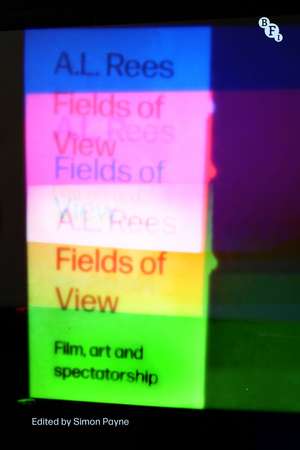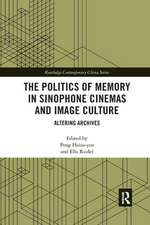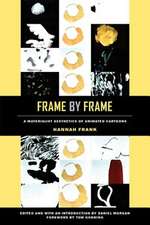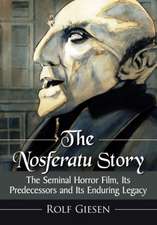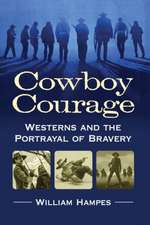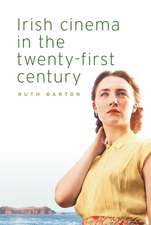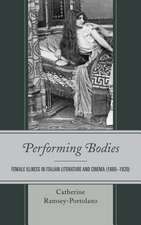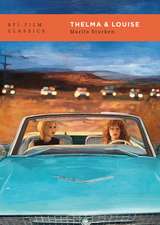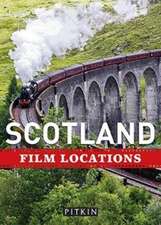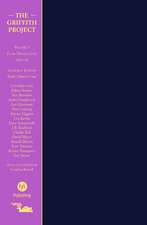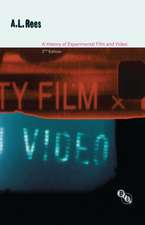Fields of View: Film, Art and Spectatorship
Autor A.L. Rees Simon Payneen Limba Engleză Paperback – 28 oct 2020
Preț: 233.46 lei
Preț vechi: 267.16 lei
-13% Nou
Puncte Express: 350
Preț estimativ în valută:
44.67€ • 46.34$ • 37.25£
44.67€ • 46.34$ • 37.25£
Carte disponibilă
Livrare economică 06-20 martie
Preluare comenzi: 021 569.72.76
Specificații
ISBN-13: 9781838719920
ISBN-10: 183871992X
Pagini: 240
Ilustrații: 68 bw illus; 19 colour illus
Dimensiuni: 156 x 234 x 15 mm
Greutate: 0.48 kg
Editura: Bloomsbury Publishing
Colecția British Film Institute
Locul publicării:London, United Kingdom
ISBN-10: 183871992X
Pagini: 240
Ilustrații: 68 bw illus; 19 colour illus
Dimensiuni: 156 x 234 x 15 mm
Greutate: 0.48 kg
Editura: Bloomsbury Publishing
Colecția British Film Institute
Locul publicării:London, United Kingdom
Caracteristici
The final work of A.L. Rees, an influential teacher, writer, curator and voice within experimental film
Notă biografică
A.L. Rees was Head of the Time Based Media course at Maidstone College of Art from 1988 - 1995 and then Research Tutor at the Royal College of Art until 2014. At various times he was the chair of the Arts Council's artists' film and video committee, and an adviser on experimental film to the British Film Institute, Tate, the Arts and Humanities Research Council and Channel 4. His book A History of Experimental Film and Video (BFI, 1999/2011) remains a key text, supplemented by the wide range of essays he wrote for journals and books on film and art.Simon Payne is Reader in Film and Media Studies at Anglia Ruskin University,UK. In addition, he is an experimental video maker whose work has shown in numerous venues including Tate Modern; the Serpentine Gallery; The Hermitage, St Petersburg and the London, Edinburgh and Rotterdam Film Festivals. He has written widely on experimental film and video, and recently co-edited Kurt Kren: Structural Film with Nicky Hamlyn and A.L. Rees.
Cuprins
Foreword: Harvesting FieldsAcknowledgementsFieldsFilm MachineFilm as Optic and IdeaExpanding CinemaRoom FilmsFilm ObjectsProjection SpaceTime FramesRealismsAsymptoteDigital DialecticFields in Braque and GehrClassic Film Theory and the SpectatorField and GestaltMonet, Lumière and Cinematic TimeDisplacement, SculptureBodies in MotionIntervalsMethods of MontageFramesFrames and WindowsConstructivism and ComputersGeometry of IntervalsNotes
Recenzii
Al Rees's testament is a cinematic thinking: film and world swooping towards each other across a landscape of fields and intervals, projections and geometries, movements in and of time and space. On every page, the generosity of the man, the curator and the teacher shape new insights into our audiovisual century and its lineage. A work of permanent illumination.
In the unlikely event that there was any doubt, Fields of View affirms A.L. Rees as one of experimental cinema's most erudite, insightful, and passionate critics and advocates. His writings, which range across a breathtaking array of subjects, ideas, works, and references, are intelligent - frequently brilliant - without ever devoting into intellectualism. They are astonishingly well-read without succumbing to mere scholasticism; we never lose the sense of an original voice, a distinct sensibility, and a great mind. Like all the best critical writing, Rees's is itself elegant, artful, provocative, and personal. This collection of essays is an excellent introduction for those unfamiliar with Rees, and a reminder to those of us who already knew his writing how important he was (and remains), and what great writing about art looks like.
In this posthumous collection of essays, A.L. Rees has woven his outstanding knowledge of avant-garde film into a startlingly original, and non-linear, reconfiguration of its history. With great agility and lightness of touch, his perceptive but unexpected juxtapositions between theorists and artists, ideas and technologies, movements and moments throw new light on key issues of film theory and aesthetics. This radical rejection of chronology, however, has an underlying message. Rees traces ways in which experimental art and artists' film have challenged traditions of space and time that, rather than abrupt rupture, create a direct connection with the forms of digital art. In the brilliant last chapters of the book, he zeroes in on this dialectic.
In the unlikely event that there was any doubt, Fields of View affirms A.L. Rees as one of experimental cinema's most erudite, insightful, and passionate critics and advocates. His writings, which range across a breathtaking array of subjects, ideas, works, and references, are intelligent - frequently brilliant - without ever devoting into intellectualism. They are astonishingly well-read without succumbing to mere scholasticism; we never lose the sense of an original voice, a distinct sensibility, and a great mind. Like all the best critical writing, Rees's is itself elegant, artful, provocative, and personal. This collection of essays is an excellent introduction for those unfamiliar with Rees, and a reminder to those of us who already knew his writing how important he was (and remains), and what great writing about art looks like.
In this posthumous collection of essays, A.L. Rees has woven his outstanding knowledge of avant-garde film into a startlingly original, and non-linear, reconfiguration of its history. With great agility and lightness of touch, his perceptive but unexpected juxtapositions between theorists and artists, ideas and technologies, movements and moments throw new light on key issues of film theory and aesthetics. This radical rejection of chronology, however, has an underlying message. Rees traces ways in which experimental art and artists' film have challenged traditions of space and time that, rather than abrupt rupture, create a direct connection with the forms of digital art. In the brilliant last chapters of the book, he zeroes in on this dialectic.
